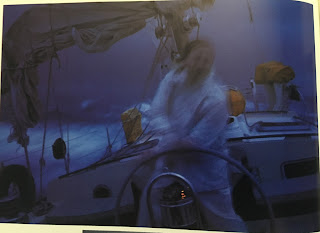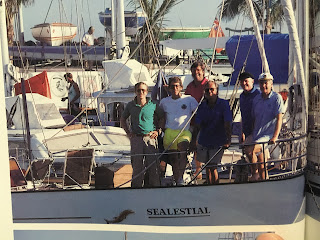- epigraph
~
“I had a strong feeling that Cruising Speed, which chronicled the events of the first week of December 1970, had in my judgment succeeded in exploring an unusual device for autobiographical revelation – easier to execute and in some ways potentially more revealing than the more comprehensive conventional treatment.”
Here’s a brief glimpse of the book, the third in our (or Bill’s) Personal Adventures On Land and At Sea. Some of it mirrors Cruising Speed, so we won’t spend as much time on some things.
MONDAY
- The drive to the office from Connecticut and Bill’s portable office, i.e. the limo, where he gets a jump on the affairs of the day. I originally intended to include some of the criticism Bill got for Overdrive, particularly the limousine, that he writes about in Right Reason (I think) but I'll save it for when I cover the non-fiction collections.
- Once in New York, to 73rd st, briefly, then to Carnegie Hall for Rosalyn Tureck. (She plays the chromatic fantasy that night, which she talks about at that link. The distinction she makes in how she approaches one bar vs. how its' been done in the past is interesting; listen for it, if you let it play through. Cool stuff.)
- There is a funny bit with Pat Boone reproduced here. Through an unfortunate bit of antonomasia, Bill mistakenly led thousands of Pat Boone’s fans and sponsors and business partners to believe he (Pat Boone) and his wife were porn addicts. It’s too much to reproduce but I was particularly amused at how, as Bill apologized more and more, Pat kept adding layers to the story, revealing new depths of the humiliation he’d endured.
TUESDAY
- More correspondence (some from Norman Lear – he loves All in the Family like everyone and (of course) which reminds him of the time he was seated next to Carroll O’Connor at the Rockefellers. The Rockefellers, Archie Bunker, Ronald Reagan, Howard Hunt – you know how it is when you answer your mail. Not to suggest impertinence; it’s part of the plan/ modus operandi. (“no coyness in the matter of who-do-you-know. There must be no concealment of friendship not exaggeration of political relationship” (re: Reagan but applies to all.) All correspondence mentioned must either have been seen or replied to, during the week being written about. (Flashbacks are okay where they make sense). And finally at a very important personal level, somewhere – right now, as a matter of fact – the point must be made that nothing can be deduced about people not mentioned, by the fact of mentioning those who are. My affection for and reliance on given human beings might be central to my life – and their names might not appear here, where anyone’s appearance is circumstantial.”
- Bill was always a strong advocate for Red Wing Peanut Butter. There’s a great bit (elsewhere but alluded to here) about how once Charlton Heston swore his favorite peanut butter was superior, only to convert on the spot when Bill produced a jar of Red Wing for an immediate taste test. (I can totally hear that in my head and see Chuck Heston's solemn face. "Hands down... the winner...") This reminds me (and it comes up in Racing Through Paradise, as well) of the appeal of catalogs in the pre-internet era. Not just for items for sale you couldn’t get locally but obscure tapes and/or bootlegs, comics mail-order, all of it. They were close, back then, when they said the future was coming from AT&T – they just misspelled Amazon, I guess.
- Jet down to a lecture in Florida then jet back to NYC for the ballet with Pat, Joe and Estee Lauder, then off to Mica and Ahmet Ertegun’s, then back to 73rd.
WEDNESDAY
- One of the days he writes his column (and attends to more correspondence, this time with the Heath Company and “the great Hugh Kenner” and then re: the sailing computer stuff we will see come to frustrate fruition in Atlantic High and oh-so-much-more of in Racing Through Paradise) so he looks at everything with that eye (“what can I write about?”) until he gets his idea. Then it’s
- Lunch with Pat and Joe, then Nickleby with Ron (Reagan, Jr.) and wife Doria. Ron was leaving Yale for the ballet, which was the topic carefully discussed at lunch. (I don't know much about Ron Reagan, Jr. - I had no idea the dude was in the ballet. That's a tough gig. You don't get such gigs by being the President's son, so kudos to him.) Then to the ballet itself.
- At some point Bill relays a funny story about the one time he managed to startle the normally unflappable David Niven. At his invitation, he’d sent David (then filming Murder By Death and thus only available by telegram in twenty-second bursts) a copy of Saving the Queen for a cover blurb, and David sent back something perfectly usable that ended with “best book I’ve ever read about saving the queen.” While painting (their shared activity in Gstaad, where the Buckleys lived a few months of the year) Bill said “I took you up on your offer and used your blurb” only when reading it back, he swapped out a word for “saving” with something a little more shocking. Apparently the delivery was such where David, if only for a moment but a cherished one, wrestled with the agony of what had happened before realizing the joke. I’d be proud of that one, too.
THURSDAY
- Some Millbrook reverie (missed the commencement speech but still terrified enough of his old schoolmaster that he didn’t want word of his frolicking on the Orient Express (i.e. some paid travel writing for the NYT) to reach him.
- Then off to the Waldorf for a speech. (I swear this happened in Thursday of Cruising Speed, as well.)
- Then off to LaGuardia to Toledo for another speech.
- Then to the hotel for a night of writing and vodka and grapefruit juice, thoughtfully packed by Pat.
FRIDAY
- Fly to Louisville to tape an episode of Firing Line.
- During the taping, a social call from Reagan. Just to thank him for kindnesses shown to Ron, jr./ got his note. This call is preceded by all the red tape with operators and phone lines of the long-distance-call era that demonstrate the rigidity of communications in the era of my childhood and early years, sinking ever further into unknowable sands for each human born into the permanently-communicating era. Bill reflects on a similar time when then-President Nixon had asked his advice on something and he first witnessed the White House’s then-unprecedented ability to phone anyone in the world, almost instantly. Living in the future, 70s/80s-style. Elsewhere he reflects on the wonderful weirdness of having not just one President call him for advice but two, the second being an actual friend.
I agree; that has to be kind of (wonderfully) weird. Of my friends, I can't picture any behind the desk at 1600 Pennsylvania Ave, nor any who'd get there (or stay there) following any advice of mine.
SATURDAY
- Some travel difficulties but home at last. Back in the office and looking over the lawn and correspondence and all such reflection kicks up in the mind.
- Visitors, among them Van, pictured here with wife Bootsie, and getting sworn in as ambassador to France, successor to Ben Franklin.
- Quick sail out into the Sound on Patito.
- Dinner with David Niven, they swap ailments-stories (“I have chronic sinusitis, Dupuytren’s contracture, and skin cancer”) before moving to sublime subjects “like each other’s books” (they share a publisher), then later, a jacuzzi.
SUNDAY
- More correspondence and all it kicks up (including how it was Airborne came to be published by Macmillan) He reflects at one point “There was a day, and I genuinely regret its passing, when people genuinely guilty of fraud were ostracized. The dissipation of the social sanction has its convenience, but I doubt that it is altogether healthy.” This reminds me of a similar sentiment in the Gore Vidal piece where he laments the degradation of the word “Nazi” and what it might one day mean – if it didn't mean so already in the 60s, when he was writing this – for a society to forget what range of attributes was accurately and actually conveyed by the term, for it just become synonymous with "dickhead." I was amused by the brief “punch-a-Nazi” frenzy in the wake of the 2016 election and remembered Bill’s words with a wince.
- Mass, then to the hospital to visit a friend.
- Surprise visit from Christo (now a speechwriter for George HW Bush), another quick sail out on the Sound, Pat’s prep for VP lunch tomorrow, traffic jam, late to speech, visit to James Burnham’s for his 76th birthday, then to drive the two hours back to New York.
MONDAY AGAIN
- Back to it. Getting the new edition of the magazine together.
- Cancelled luncheon on account of striking workers. All that work, all the disappointment. Ah well. They (the VP’s people) sent Jeanne Fitzpatrick instead. Not their fault. What can be done? Everyone adapts. Long day, dinner and drinks, reflective mood late-night:
"The chair by my bed is stacked high with books and magazines. But I am tired and settle for the blaring headline of the evening paper. There is a story that the Stamford Advocate has fired the roommate of Kathy Boudin because the publisher didn't believe her story of not knowing that Mrs. Boudin was a fugitive from justice. The Stamford Advocate is owned now by the Los Angeles Times. It was a suggestion from the editor from the Stamford Advocate, made to Harry (x), that caused Harry to call me in 1962 and proposed that I write a newspaper column.
But my mind is wandering now, so I turn off the light.
'Weariness, Bill, you cannot yet know literally what it means. I wish no time would come when you do know, but the balance of my experience is against it. One day long past you will know true weariness and say 'that was it'." - letter from Whittaker Chambers, 1961."
~
And so it ends. A fine companion to Cruising Speed, as both are fine supplementals to the sailing books, to which we will return (Atlantic High) next time.













































